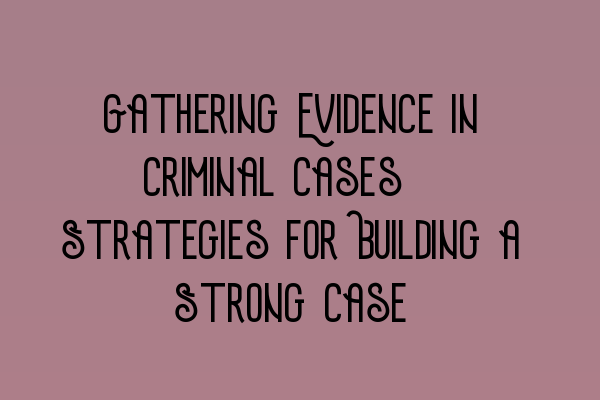Gathering Evidence in Criminal Cases: Strategies for Building a Strong Case
When it comes to criminal cases, one of the most crucial elements of a successful defense strategy is gathering strong evidence. Evidence is the foundation upon which the case is built, and it plays a vital role in determining the outcome in court. In this article, we will explore effective strategies for gathering evidence that can help build a strong case
The Importance of Evidence in Criminal Cases
Before we dive into the strategies, let’s first understand why evidence is so important in criminal cases. Evidence provides proof of the events that took place, and it helps establish the guilt or innocence of the accused. Without substantial evidence, it becomes challenging to convince the court and the jury of the defendant’s innocence or prove the prosecution’s case beyond a reasonable doubt.
Now that we understand the importance of evidence, let’s explore some strategies to gather the strongest evidence possible:
1. Conduct a Thorough Investigation
A thorough investigation is the foundation for gathering solid evidence. This includes interviewing witnesses, collecting documents, reviewing CCTV footage, and analyzing any available physical evidence. By leaving no stone unturned, you increase your chances of discovering crucial evidence that can either support your client’s innocence or cast doubt on the prosecution’s case.
2. Preserve and Document the Evidence
Once you have identified potential evidence, it is vital to preserve and document it properly. This includes taking photographs, creating detailed notes, and securing any physical evidence. By documenting the evidence accurately, you can present it in court convincingly. Remember, proper documentation can make or break your case.
3. Hire Expert Witnesses
In some cases, expert witnesses can provide invaluable insights and analysis that can strengthen your case. Expert witnesses bring their specialized knowledge and expertise to the table, helping to explain complex evidence and providing a professional opinion. Whether it’s a forensic expert, a medical professional, or a digital analyst, their testimony can significantly impact the outcome of a trial.
4. Forensic Examination
Forensic examination of evidence is often a crucial step in building a strong case. Forensic experts analyze physical evidence such as DNA, fingerprints, ballistics, and other trace evidence to establish or refute a connection to the crime. This scientific examination plays a pivotal role in supporting your defense strategy.
5. Stay Updated with Legal Developments
Keeping up-to-date with legal developments is essential in gathering evidence effectively. Laws and regulations change, and being aware of any recent legal developments can help you identify new avenues for evidence gathering. Stay informed about changes in procedures, legal precedents, and any advancements in forensic technology that could impact your case.
6. Collaboration with Investigators and Experts
Collaboration is key when gathering evidence in criminal cases. Working closely with private investigators, forensic experts, and other professionals can help you uncover new leads and gather stronger evidence. Their expertise and experience can contribute significantly to building a robust defense strategy.
7. Consistent Communication with the Client
Gathering evidence is a collaborative effort between the solicitor and the client. Maintaining open and consistent communication with your client throughout the process is essential. Regular updates, explaining the status of the case, and seeking their input can help both parties work together effectively towards building a strong defense.
In conclusion, gathering strong evidence is paramount in any criminal case. By conducting a thorough investigation, preserving and documenting evidence, hiring expert witnesses, utilizing forensic examination, staying updated with legal developments, collaborating with investigators and experts, and maintaining consistent communication with your client, you can build a compelling defense strategy.
For more information on SQE preparation and exam schedules, check out the following resources:
- SQE 1 Practice Exam Questions
- SQE 1 Practice Mocks FLK1 FLK2
- SQE 2 Preparation Courses
- SQE 1 Preparation Courses
- SRA SQE Exam Dates
Remember, a solid evidence base is the key to building a strong case in criminal law. By implementing these strategies and utilizing the available resources, you can greatly increase your chances of success.
